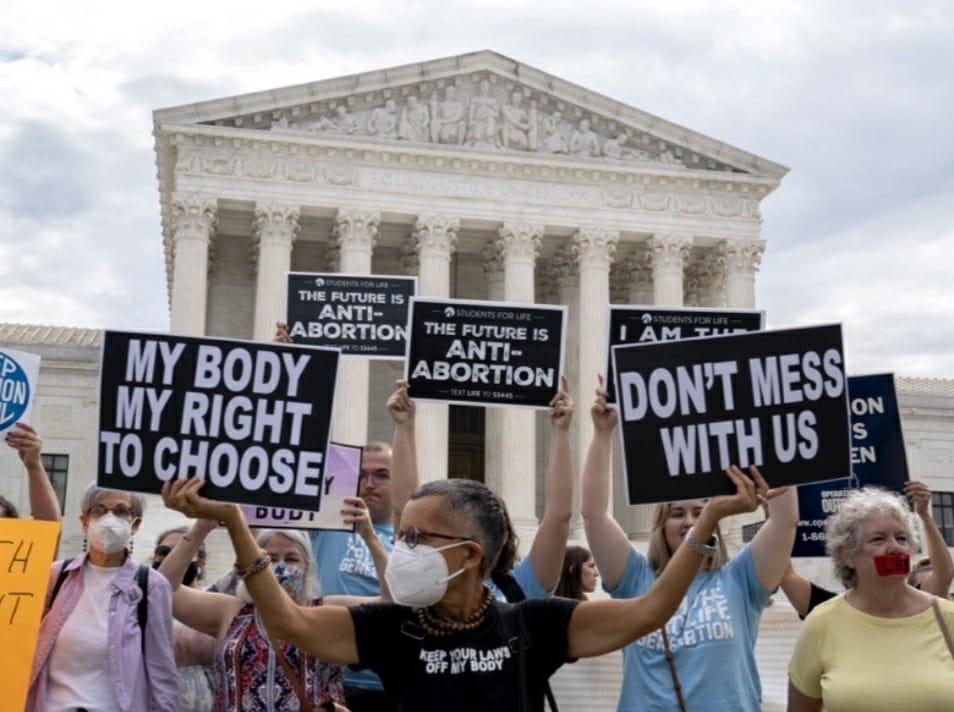The Supreme Court of the United States is hearing a case that could reverse decades of abortion access in the United States, in what women’s rights advocates are calling a potential watershed moment in the country’s history.
The Supreme Court of the United States began hearing oral arguments on whether a Mississippi state law enacted in 2018 that prohibits most abortions after 15 weeks of pregnancy is unconstitutional
The hearing sets the stage for a Supreme Court decision next year that could overturn nearly 50 years of federally protected abortion rights granted in the landmark judgement of Roe v Wade decision. About the outcome of the Mississippi case, Marge Baker, executive vice president of People for the American Way, a progressive political advocacy group that supports abortion rights, said, “The threat is very real.”
Also Read : “We cannot convert ourselves into supervisory authority”: SC Dismissed Petition challenging pattern of CMA exams
“With the help of Republican allies, the far-right has been working to fill the courts with anti-abortion opponents. In a phone interview with Al Jazeera on the eve of the Supreme Court hearing, Baker said: “We could see Roe v Wade totally undermined.”
Roe Vs. Wade
In Roe v Wade, the Supreme Court ruled in 1973 that women have a constitutional right to an abortion before they reach 24 weeks of pregnancy, the point at which a foetus is considered viable
In 1992, a second landmark case, Planned Parenthood v Casey, upheld and revised that decision, ruling that US states could not impose an “undue burden” on women seeking abortions before 24 weeks of pregnancy.
The Mississippi abortion law was declared unconstitutional by the Fifth Circuit US Court of Appeals in 2019, ruling that “the Supreme Court’s abortion cases have established (and affirmed, and re-affirmed) a woman’s right to choose an abortion before viability in an unbroken line dating back to Roe v Wade.”
They’ve been arguing for years that the Supreme Court made a mistake in that case, and they’ve been pushing to install judges on federal courts who would overturn the decision.
“We want states to be able to pass laws that reflect people’s values, to use the democratic process to achieve consensus, and consensus will look different depending on where you are,” Quigley said.
Meanwhile, the Mississippi case, which is expected to be decided in the months leading up to the 2022 mid-term elections, will have significant political ramifications.
“If you want to see a revolution, outlaw Roe v Wade and see what the public’s reaction is, especially among young people,” Democratic Senator Jeanne Shaheen said.
Any overturning of Roe v Wade would also go against public opinion in the United States, where abortion rights are widely supported – even among Republicans and evangelical Christians.
Also Read : Islamist mob lynched a Sri Lankan manager of Rajko factory to death in Sialkot, Pakistan
Thousands of people marched in cities across the United States last month to demand that abortion rights be protected – and to denounce a Texas state law that effectively prohibits abortion after six weeks of pregnancy. Separate challenges to Texas legislation, which allows private citizens to enforce the ban by seeking financial judgments against abortion providers, were heard by the US Supreme Court in November. However, women’s rights advocates are concerned about how the Supreme Court’s conservative majority will impact its decisions in the Texas and Mississippi cases.
Former President Donald Trump appointed three new conservative justices to the Supreme Court during his four years in office, including Justices Neil Gorsuch and Brett Kavanaugh, who has already indicated a willingness to overturn Roe.

